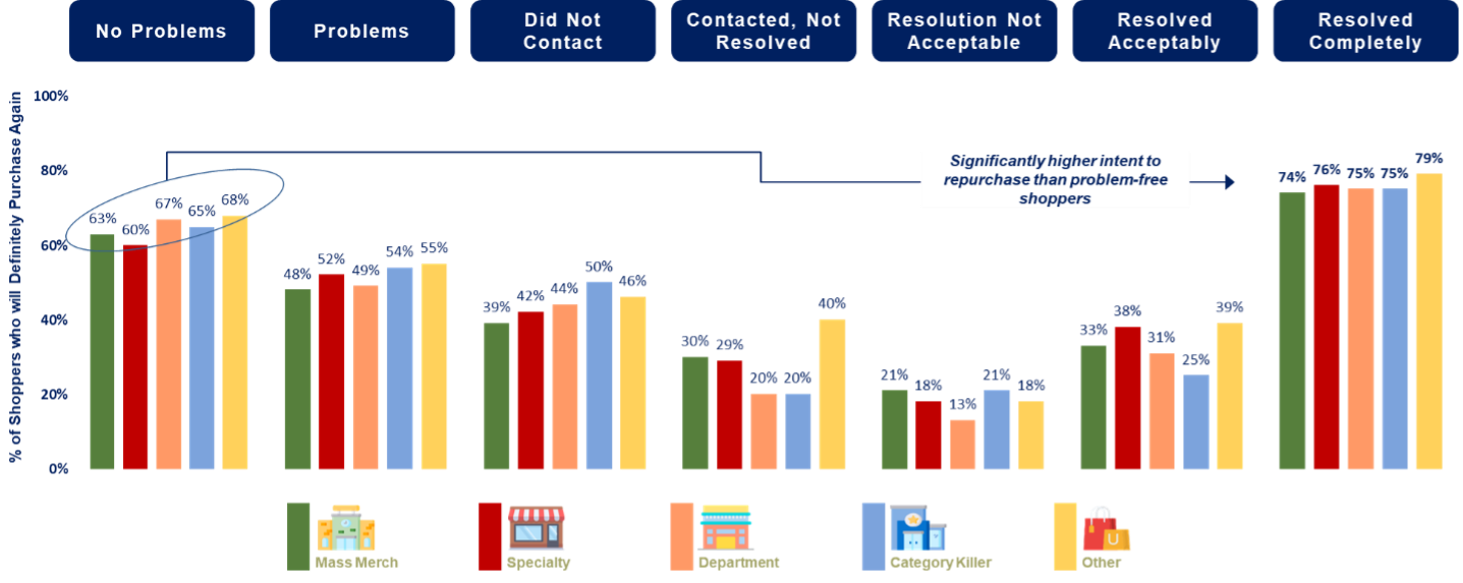The Verde Group originally posted this blog in November 2018. Now 6 years later, does Amazon continue to make us lazy shoppers? The answer is undoubtedly, yes. It is well known that the COVID-19 pandemic changed shopping habits, dramatically increasing online shopping of all consumer goods. However, online shopping trends didn’t change after the pandemic. It is currently predicted that there will be an 8% increase in e-commerce sales worldwide in 2024. Knowing this, an e-commerce retailer’s actions to improve the lazy online customer experience are vital to growth.
With consumer shopping behavior changed for the foreseeable future, what potential risks lie ahead? In a 2021/2022 study conducted by Verde Group, we explored CX friction and WOW! experiences for over a dozen name brands, including Amazon, In our study, we found that there are clear advantages and lingering challenges facing retailers today. Specifically, we found that Amazon has a clear advantage by consistently and systematically using prior purchase history to recommend products to their customers. However, it is also clear that they are at a distinct disadvantage when it comes to hassle-free customer support when compared to all other retailers studied.
So, when it comes to Amazon making us lazy, is it truly that we are becoming lazy shoppers? Or is it that we are becoming complacent? Are we lowering our expectations on service for the benefit of speed and convenience?
Let’s face it – in this age of convenience, it’s easy to cut corners, and as a working parent of young kids, I welcome any opportunity to be lazy. I’ve also noticed that over time, I’ve continued to return to the products and businesses that make my life easier. Amazon is easy. I can reach my end goal with the least amount of time and effort when I shop with Amazon. And let’s be honest, I’d much rather spend my time with my children than spend hours researching my online purchases.
But this focus on convenience is only on one portion of the journey. When we factor in receiving items and potentially needing to address questions about the products we’ve received, it will likely require more work, time, and attention. So much for being lazy!
Why has laziness (or convenience) become so important?
“Busy” is the most common answer to the age-old question “How are you doing?” I hear that response so much that I try not to use it myself. Busy is the new normal, and according to Nielson, our quest for convenience is driven by two primary forces – new consumer challenges and changing lifestyles. We are busier, more connected, and more on-the-go than ever. As a result, we are stressed, receive too much information, and are constantly fatigued by the amount of complexity surrounding us.
While over time all of these challenges have changed our lives, one thing has remained the same — we still have only 24 hours in a day and seven days in a week. As we work to prioritize our precious time, we need to reserve our mental and physical activity for the things that matter most. And, outside of big-ticket items like a home or car, that doesn’t include most of our purchases.
However, shouldn’t we expect more from retailers? I know, convenience is great, but Verde Group data suggests that mass merchants, and Amazon in particular, lag behind all other retail categories in delivering WOW! experiences. Herein lies the opportunity.
How can companies like Amazon increase the WOW?
While the definitions of “WOW” may be somewhat subjective, our research at he Verde Group suggests that most people view it similarly.
After surveying nearly 1,200 consumers, we found the following points where Amazon lags behind other retailers:
- Quality of products consistently great
- Ease of shopping experience; no problems encountered from start to finish
- Hassle-free customer support
- Retailer offers to order/deliver out of stock item
- Support associates who go “above and beyond”
- Support associates who stay with you until a problem is completely resolved
- Support associates who seem genuine
The good news for Amazon and for many retailers we studied, is that a majority of issues reside with front-line staff and the ability to resolve issues when they occur. We see this time and time again in our work. Quickly and effectively resolving CX friction when it occurs will rebuild loyalty and increase purchase behavior in the future.

This makes sense. If there’s a need to reach out to customer service, then most likely something has already gone wrong with a product or service. If a customer is already upset before speaking to someone, it’s easy to see how a poor experience (like a long hold time or information repeated over and over) can increase their frustration.
Knowing the potentially high impact this service interaction can have on customer loyalty, it’s critical that customer service receives the attention and resources needed to achieve satisfactory problem resolutions.
The lazier I get to be, the more I’ll buy from you. Am I alone in this evolution?
Don’t worry, you and I aren’t alone! When it comes to service, companies create loyal customers primarily by helping them solve their problems quickly and easily.
In the book The Effortless Experience, the authors report that four of the five drivers of disloyalty involve additional effort that customers are compelled to put forth. The Verde Group’s research confirms this as well. If a customer feels it is easy to do business with our selected client, then they are most likely to be a promoter of that company. And if the customer believes that the company is not easy to do business with, there is a high chance that the customer will be a detractor.
With that in mind, here are three steps to improve your customers’ laziness:
- Identify the points of friction in your purchase experience and develop a plan to improve those areas. Prepare to spend significant time diving into the customer service experience. Is that experience helping your customers solve their problems quickly and easily? What about your return policy?
- Learn what your customers are doing before, during, and after their shopping experience. Are they leaving your site or store to compare prices? To help your customers to make easy purchase decisions, you must start with understanding what they are doing today.
- Make “simplicity” the mantra of your customer experience. Across touchpoints, both online and brick and mortar, ask yourself: “Is this experience simple for the customer?” If the answer is no, then go back to the drawing board.
These types of improvements in your customer experience are likely to increase loyalty, positive word of mouth, and customer recommendations. As consumers, we’re all “busy” and overwhelmed. The last thing we want is to have to jump through hoops to give a company our money.
If you’re like me, a convenient shopping experience is great… it lets me be lazy and focus my time on the more important things in my life. However, when things go wrong, don’t drop the ball. I expect that same frictionless experience wherever in the journey it may occur. If you do that, I’ll be loyalty for life!
This article was originally published on November 5, 2018.
